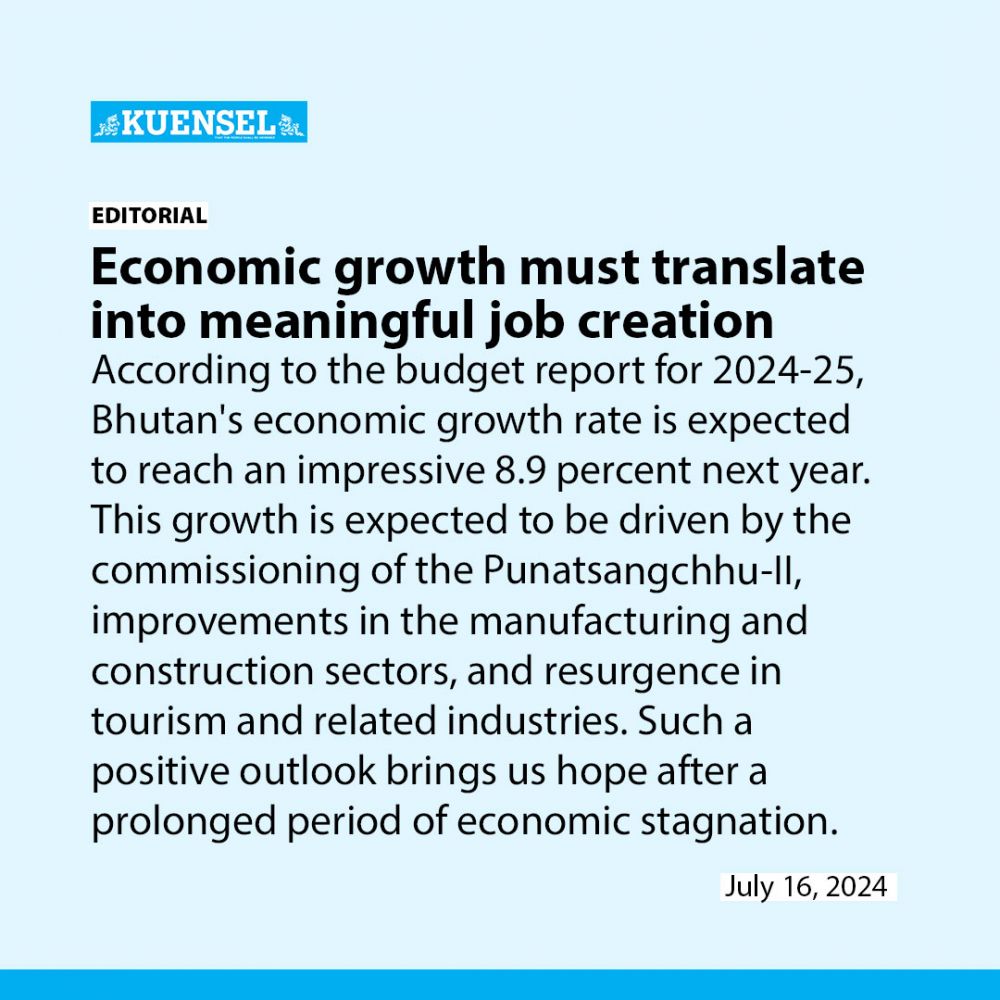
According to the budget report for 2024-25, Bhutan’s economic growth rate is expected to reach an impressive 8.9 percent next year. This growth is expected to be driven by the commissioning of the Punatsangchhu-II, improvements in the manufacturing and construction sectors, and resurgence in tourism and related industries. Such a positive outlook brings us hope after a prolonged period of economic stagnation. However, this projected growth must go beyond mere statistics and result in substantial job creation to address the numerous challenges our country faces today.
The report highlights that government initiatives like the Economic Stimulus Programme (ESP) will further fuel economic growth. For the fiscal year 2024-25, the government has allocated Nu 97.63 billion, marking the first year of the 13th Plan. From the Nu 15 billion earmarked for the ESP, the government has yet to disburse the first tranche of Nu 2.5 billion. In the agriculture sector, growth is anticipated to reach five percent between 2024 and 2025. These figures are promising, but the real measure of success will be the creation of meaningful employment opportunities for our citizens.
Economic growth, while essential, is not an end in itself. It must be a means to improve the livelihoods of the people. The lack of job opportunities has led to a series of interrelated issues, such as declining agricultural productivity, increasing rural-to-urban migration, and the more severe problem of out migration. Young talents are leaving Bhutan in search of better opportunities abroad, which not only depletes our human capital but also threatens the future of our nation’s development.
To harness the benefits of economic growth, there is a need to focus on creating jobs that are both meaningful and sustainable.
The anticipated improvements in manufacturing and construction sectors offer a golden opportunity to generate employment. These sectors can absorb a significant portion of the workforce, provided that there is a concerted effort to enhance skills training and vocational education. By equipping our youth with the necessary skills, we can ensure they are ready to take on new roles and contribute to the nation’s growth.
Tourism, another pillar of our economy, presents vast potential for job creation. However, this requires us to move beyond traditional tourist offerings and innovate in service and product development. Community-based tourism, adventure tourism, and cultural immersion experiences can create jobs while promoting sustainable tourism practices. Investments in these areas can yield high returns in terms of both employment and revenue.
The agriculture sector, despite its challenges, remains critical to our economy. The projected five percent growth in the sector must translate into tangible benefits for farmers. This includes improving access to markets, providing better infrastructure, and introducing modern farming techniques. By making agriculture a viable and attractive livelihood option, we can significantly curb rural-to-urban migration and stabilise rural communities.
The government’s disbursement of the ESP funds, therefore, should be strategic and targeted. Investments should focus on sectors with the highest potential for job creation. Small and medium enterprises (SMEs), which are the backbone of our economy, deserve special attention. Providing SMEs with access to finance, training, and market linkages can stimulate job creation and foster entrepreneurial spirit.
Addressing the issues of unemployment, rural depopulation, and outmigration require an approach that integrates economic growth with job creation strategies.












